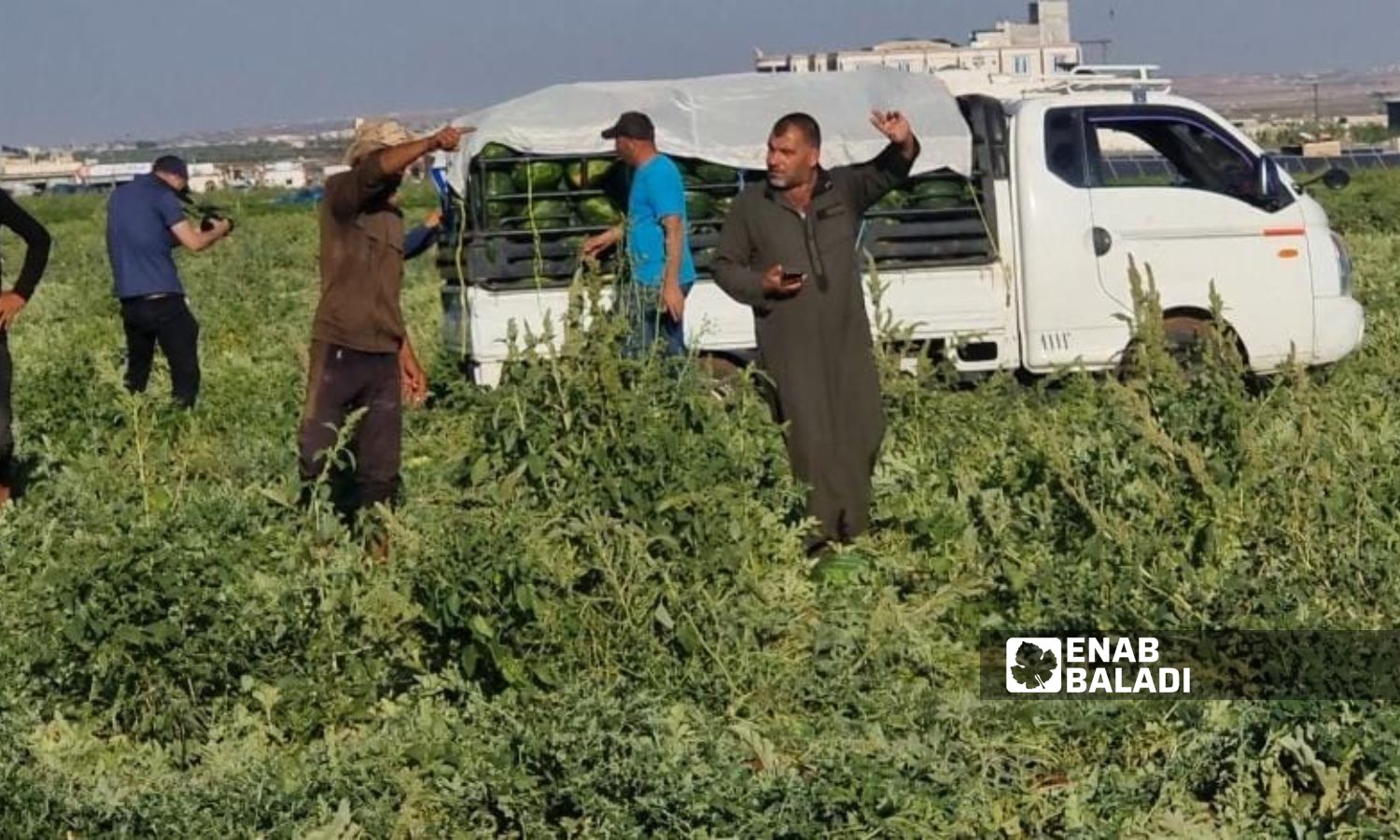



Idlib – Anas al-Khouli
Amer Ismail refrains from buying watermelon this year despite the season’s start, opting for other types of fruits instead, as he was unsuccessful in buying a sweet-tasting watermelon in 2023, since the idea of grafting watermelon plants with pumpkin spread, which increased its size and eliminated the sweet taste.
Ismail (41 years old), a displaced person residing in Idlib city, said he did not get any “delicious” watermelon in the summer of 2023. All the fruits he bought, although red in color, were tasteless, “like water,” as he described.
Ismail told Enab Baladi that all methods of checking watermelon ripeness that people were accustomed to, such as tapping on the watermelon or ensuring its head was dry, were pointless because the issue was not about the fruit’s maturity.
Mrs. Wafaa al-Mohammed (35 years old) agrees with the previous viewpoint, saying she was embarrassed in the summer of 2023 to serve watermelon to guests because its taste changed, and its texture was soft, indicating spoilage in both yellow and red types.
Watermelon is highly coveted by locals in Syria, and they eagerly await the summer to consume it often, even for breakfast with cheese. It is also served to guests.
In recent years, the popularity of watermelon has declined, with residents expressing dissatisfaction over the enlarging fruit size, losing its sweet taste as usual.
Many believe that the corruption and flavor loss of watermelon are due to greedy farmers grafting it with pumpkin plants to increase the fruit size and secure more profits, leading to a decline in purchase rates, according to merchants who spoke to Enab Baladi.
Jamil al-Issa, a fruit vendor in Idlib city, told Enab Baladi that although the season has just begun, the demand for watermelon this year is very low, dropping to 50% compared to previous years, attributing it to poor quality.
Typically, the demand for watermelons is high at the season’s start, as customers wait for it all year long, but the poor quality in 2023, customers’ dissatisfaction, and incorrect concepts about watermelon cultivation affecting its taste, have left people less enthusiastic to buy it, according to the vendor.
Al-Issa added that the beginning of the season is not promising, but he hopes that demand and sales will improve with the rising temperatures, potentially bringing back the sweet taste of watermelon.
According to al-Issa, his usual order was every three days, weighing between 500 and 700 kilograms, but this year he orders half the amount and struggles to sell it.
He mentioned that the price per kilogram of red watermelon is 5 Turkish liras, and yellow watermelon is 7 liras, considering the prices suitable for citizens.
A worker’s daily wage in the best situation is 100 Turkish liras (around three US dollars), while the recognized poverty threshold is 10,378 liras, and the extreme poverty threshold is 8,984 liras.
The failure or success of watermelon cultivation primarily depends on the farmer’s experience, pest control at the right times, and climate conditions. Grafting has no impact on the taste, according to agricultural engineer Maher Qraitibi.
Qraitibi told Enab Baladi that grafting is done when the pumpkin plant has two complete true leaves by cutting the pumpkin plant, trimming the watermelon plant’s roots, placing it where the pumpkin was, and combining both plants to get the hybrid watermelon.
The goal of grafting is to leverage the pumpkin plant’s roots to increase the fruit size and help the watermelon plant resist diseases, with the assurance that grafting does not affect the taste.
The agricultural engineer attributed the loss of watermelon taste to high temperatures in recent years, negatively impacting the plant and causing the sweet taste of red watermelon to disappear and the sweet taste to turn bitter in yellow watermelon.
Last year, temperatures in northwest Syria exceeded 40 degrees for over 60 days during the watermelon season, with some days reaching 48 degrees, affecting agricultural seasons, especially watermelon.
The other reason for the poor quality of watermelon in 2023 is the infestation of crops with the thrips insect, which harms watermelon crops, and the spread of diseases among plants, according to the agricultural engineer.
Watermelon cultivation is mainly centered in the al-Rouj plain area and regions in northern Idlib and southwestern rural Aleppo. It is cultivated in two ways: the first is using tunnels to get early fruits, requiring special and costly care.
The second method is planting watermelon in agricultural fields under the sun, with cultivation starting at the beginning of May and lasting between 65 and 80 days.
if you think the article contain wrong information or you have additional details Send Correction